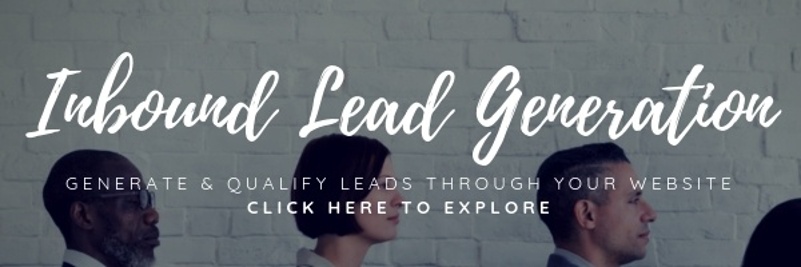These leads are #*(&$# TERRIBLE!!!)
Are you tired of hearing your salespeople give you excuses for not hitting their goals? Here are some simple tips for generating awesome b2b sales leads, so you don't have to hear it any more..
Better yet - creating a b2b lead generation process that delivers results can even drive pipeline predictability...
For my first 10 years in B2B sales, and there wasn't a single day that went by where I wasn't thinking or shouting, "THE LEADS! THE LEADS! God, these leads are awful!" I felt like Jack Lemon on Glengarry Glen Ross... desperate to get some kind of support that meant something.
We were pulling our sales leads from purchased lists, directories, and software that scraped the internet for basic contact information...and then tried to pass them off as a b2b lead. Because of this, our calls were ice cold, and there was a diminishing return that everybody on the sales floor could see, but none of the decision-makers were willing to admit.
Your b2b marketers will support what I'm about to show you because it helps them develop connections between their efforts and your outcomes. Your salespeople will support it too, although, they may need a little help with the transition (which they'll never admit to), because inbound leads won't respond to outbound tactics.
Here are 3 steps for generating hot b2b sales leads - and more importantly, closing more deals
Some of this is about updating your b2b marketing plan. Some of it is about a culture shift with your sales team. B2b marketers and sales people don't always mix, so one of the most critical steps you need to take is getting everybody on the same page.
Step 1: Align your priorities
Typically overlooked, alignment is all about growth. It provides valuable insights for marketing and helps you identify holes that exist in your sales process. But here's the reality... Your inbound B2B leads aren't going to mean jack-squat without an appropriate B2B sales strategy coupled with your marketing strategy, particularly one that is inbound in nature.
These holes represent opportunities for quick wins and provide clearer paths to victory when you start feeding sales with better leads.
1 - Persona development will lead to:
- Identifying challenges your business can resolve
- Understanding where your perfect customer searches for information
- Content ideas that feed effective marketing programs
- Updating your sales process
2 - Company profile development
Do you have a handle on the ideal and non-ideal characteristics of your perfect company? Building out your company profiles will help your b2b marketers target the appropriate settings.
3 - Define MQLs and SQLs
If you expect to successfully equip your salespeople with quality b2b sales leads, you need to know what, exactly, a qualified lead looks like. There are two different stages in the qualification process, Marketing & Sales.
Marketing Qualified Lead (MQL): They check all of the boxes that marketing is responsible for in order for sales to take a sincere interest. For example, they'll be the right persona, you'll know their industry and company name, and they'll have exhibited behavior that indicates they are interested in your services (ie, downloaded a MOFU or BOFU content offer, or submitted a contact form).
Sales Qualified Lead (SQL): They're more qualified than MQLs because they often require interacting with sales to fill in the blanks. They could include the budget amount, a relevant need, and/or a timeline for achieving their goals.
This information will feed the rules that automate lead distribution, and elevate them when they are the most receptive to hearing from your company.
4 - Deal stage and entrance criteria evaluation
As we start feeding your sales team with inbound leads, we need to be able to measure and drive success, so you can build and improve over time. One of the ways we can solve this challenge is to create milestones in the sales cycle.
A typical b2b deal stage structure will look like this:
- Connect (first call)
- Discover (exploratory call)
- Plan/Demo
- Recommendations
- Proposal sent
- Proposal reviewed
- Closed won
- Closed lost
In this example, there are 6 steps before b2b leads become customers. The more expensive a product/service, and/or the more disruptive in nature, you may add steps to it.
By creating these stages, you can see how long deals sit in one stage vs the next, identify trouble spots in your sales cycle, and get a more realistic sales forecast.
The second half of this is "entrance criteria." This means that we're creating required data points when salespeople move a deal from one stage to the next. It's an important step in ensuring they're complying with your sales structure and gathering data you have determined as being critical to the success of a deal.
Hubspot Sales forces this entry between stages, which I love. It might look something like this:
- Connect - interest level
- Discover - Goals, plans, challenges, budget, contact authority, needs, timing
- Plan/Demo - Start date, commitment levels, proposal requirements
- Recommendations - Updated start date, commitment levels, signer
- Proposal sent - Kickoff date & time
- Proposal reviewed - Change requirements
- Closed won
- Closed lost - Reason for losing
5 - Inbound Sales Architecture
It is absolutely imperative that sales have a plan for the leads generated through your inbound funnel in the world of modern B2B sales. What makes them successful with outbound very likely won't work with inbound, and it starts from the moment in time when that inbound lead has been first generated.
Inbound sales architecture should include standards around:
- Response time based on MQL, SQL, or Lead status
- Messaging strategy
- Follow-up strategy & cadence
- Email/voice strategy
Step 2: Automate your sales process
Building out your sales infrastructure will help you automate lead distribution and many other activities that prevent good opportunities from slipping through the cracks.
Pipeline management:
Organize your opportunities based on important milestones and qualifications. Embed your process into your pipeline management tools.

Automation:
- Lead distribution
- Appointment setting
- Data entry
Elevation:
- Hot buying signals
- enable a 5-minute or less response time to highly engaged activities
Enablement:
Improve Sales' chances of success by standardizing their collateral, and making improvements based on behaviors, dictated by hard data. (learn more about sales enablement)

With a modern sales process driven by modern technologies, you'll be able to measure and predict the impact of ALL of your sales and marketing investments. More importantly, you'll equip sales to close more sales at a higher velocity.
Step 3: Generate your own leads
Let me introduce you to the inbound lead generation methodology. Maybe you've met. Maybe you have even tested your hand at it in the past. But let's get reacquainted because it doesn't play the same role it did 5 years ago.
Inbound is a B2C or B2B lead generation marketing technique. It follows the same general principles, but without alignment and technology, you're going to struggle to derive any real value from it... or at least measure that value.
1 - Attract visitors to your website:
- SEO
- Blogging
- Social Media
- Paid Ads
2 - Convert qualified visitors into leads:
- CTAs (what's that?) & links
- Landing pages
- Forms
- Content offers
3 - Get leads to sales when they're ready for contact
- Email nurturing
- Sales alerts
- Lead scoring
CONCLUSION:
Generating quality b2b leads is about engagement, context, and making contact at the exact right moment. By aligning goals and knowledge, modernizing your sales process, and generating inbound leads through your website, your salespeople will be able to do more, and you'll be able to objectively evaluate the performance of all of your related investments.
Learn more about our inbound lead generation services HERE:



